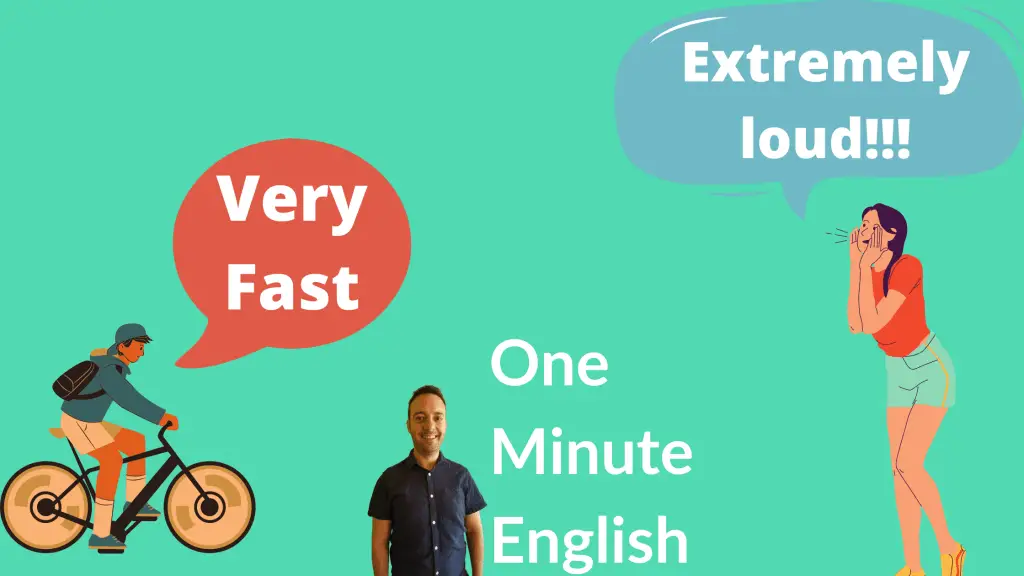Usamos intensificadores para tornar os adjetivos mais fortes.
Aqui está uma lista dos intensificadores mais comuns:
- absolutely
- amazingly
- astoundingly
- at all
- awful
- bitterly
- bloody
- completely
- crazy
- dead
- dreadfully
- colossally
- especially
- exceptionally
- excessively
- extremely
- extraordinarily
- fantastically
- frightfully
- fully
- hella
- incredibly
- insanely
- literally
- mad
- mightily
- outrageously
- particularly
- phenomenally
- precious
- quite
- radically
- rather
- real
- really
- remarkably
- ridiculously
- so
- somewhat
- strikingly
- super
- supremely
- terribly
- terrifically
- too
- totally
- unbelievably
- veritable
- very
Muitos intensificadores têm o mesmo significado, mas alguns deles são diferentes e alguns deles só funcionam em certas situações (extremamente confiantes, amargamente decepcionantes).
Vejamos alguns exemplos de sentenças:
I am absolutely delighted with my exam results.
I didn’t like the movie at all.
I was bitterly disappointed after the game.
I am dreadfully bad at football.
I am especially good at tennis.
That game is dead easy.
The new Red Dead redemption game is insanely good.
I am quite busy at the moment.
He is rather tall.
It is so hot in here.
That company are super cool to work for.
I am totally late for work.
O que são intensificadores?
Intensificadores tornam os adjetivos mais fortes. Really e Very são intensificadores muito comuns.
I did well in the exam.(90%)
I did really well in the exam. (98%)
Alguns adjetivos já são fortes, portanto não podemos usar very e really com eles. Podemos usar absolutely ou completely com adjetivos fortes.
I did terrible in the exam. (20%)
I did absolutely terrible in the exam. (5%)
I did really terrible in the exam.
Intensificadores dão mais ênfase ao que você quer dizer. Eles tornam sua frase mais extrema e, portanto, mais interessante.
Alguns intensificadores são regionais e usados apenas em certas partes do mundo. Os intensificadores também se tornam populares por um determinado período de tempo e depois perdem popularidade.
Totally(U.S.A,)
He is totally crazy about you.
Literally (U.K, U.S.A)
This is literally the best thing I have ever eaten.
Heaps (Australia)
This beer is heaps good.
Mad (Ireland)
The pub is mad busy.
Algumas pessoas acham irritante o uso excessivo de intensificadores porque, se você torna tudo extremo, então é difícil saber quando algo é realmente extremo.
Intensifiers geralmente vêm antes de um adjetivo.
That football player is very bad.
I think that is absolutely terrible.
Intensificadores fracos
Alguns exemplos de intensificadores fracos incluem:
Quite
Isso mostra que algo é um pouco mais forte do que o esperado, mas não é tão forte quanto muito.
The movie was quite good but I thought it would have been better.
It is quite warm today.
Pretty, Fairly
Pretty e fairly são usadas para algo que não foi tão bom quanto o esperado.
The movie was fairly good.
He is pretty good at football but not brilliant.
Intensificadores com comparativos e superlativos
Podemos usar far, much, or a lot para adjetivos comparativos.
He is far better than me at football.
He is much better than me at football.
He is a lot better than me at football.
Podemos usar by far, or easily com adjetivos superlativos.
He is by far the best at football.
He is easily the best at football.
Adjetivos como intensificadores
Algumas vezes usamos adjetivos como intensificadores
Aqui está uma lista com exemplos de sentenças:
Absolute
He was absolute rubbish in that game.
Complete
That is complete nonsense.
Total
That is total rubbish.
Real
That coat is real nice.
Utter
That is utter nonsense.
- Como Verificar se os Alunos estão usando o ChatGpt(+outros escritores A.I.) - janeiro 13, 2023
- Meus Escritores de I.A Favoritos para 2023 (Geradores de Texto I.A) - janeiro 2, 2023
- Qual é o custo de estudar na Wizard?(Preço do Wizard 2022) - maio 10, 2021


